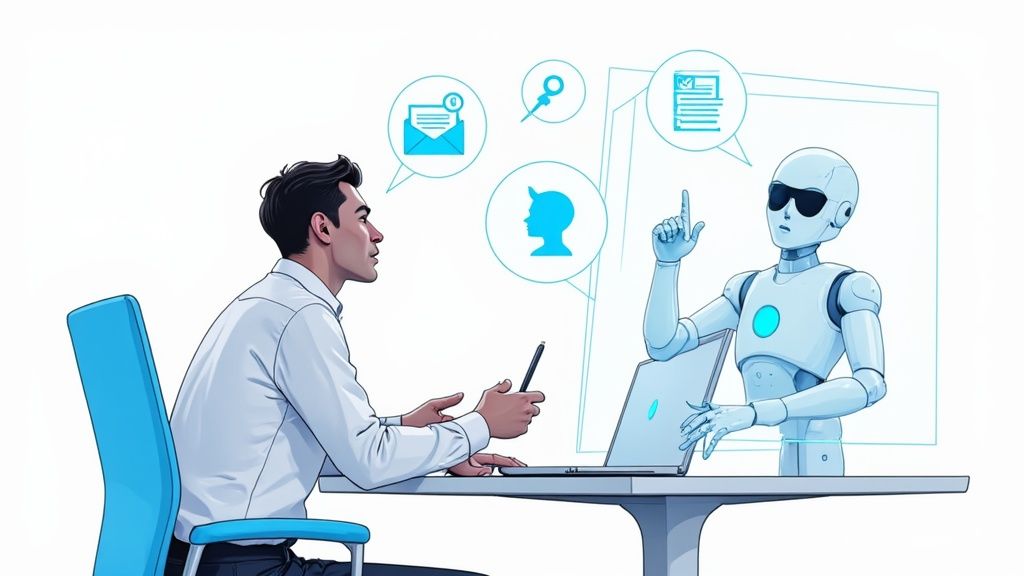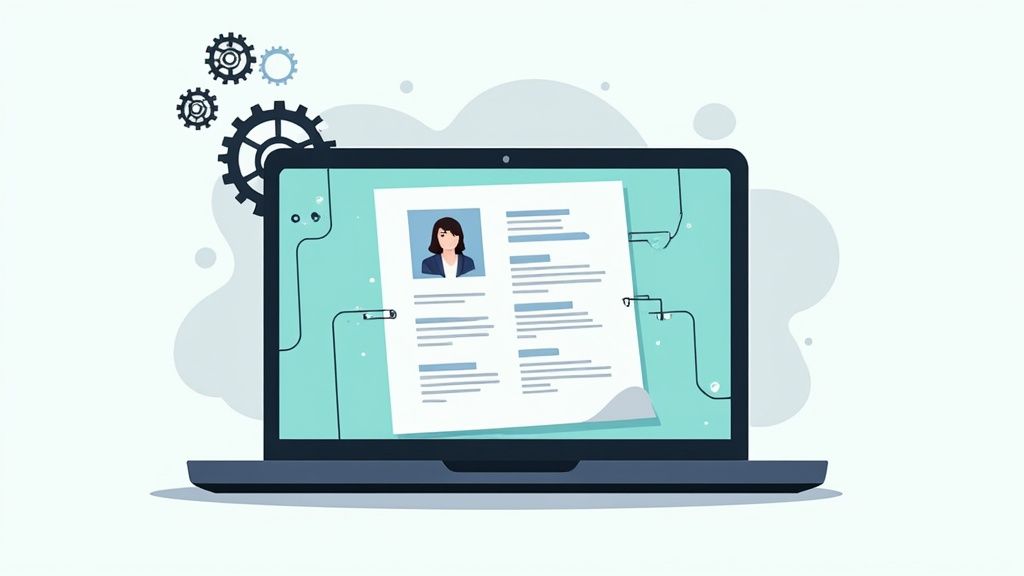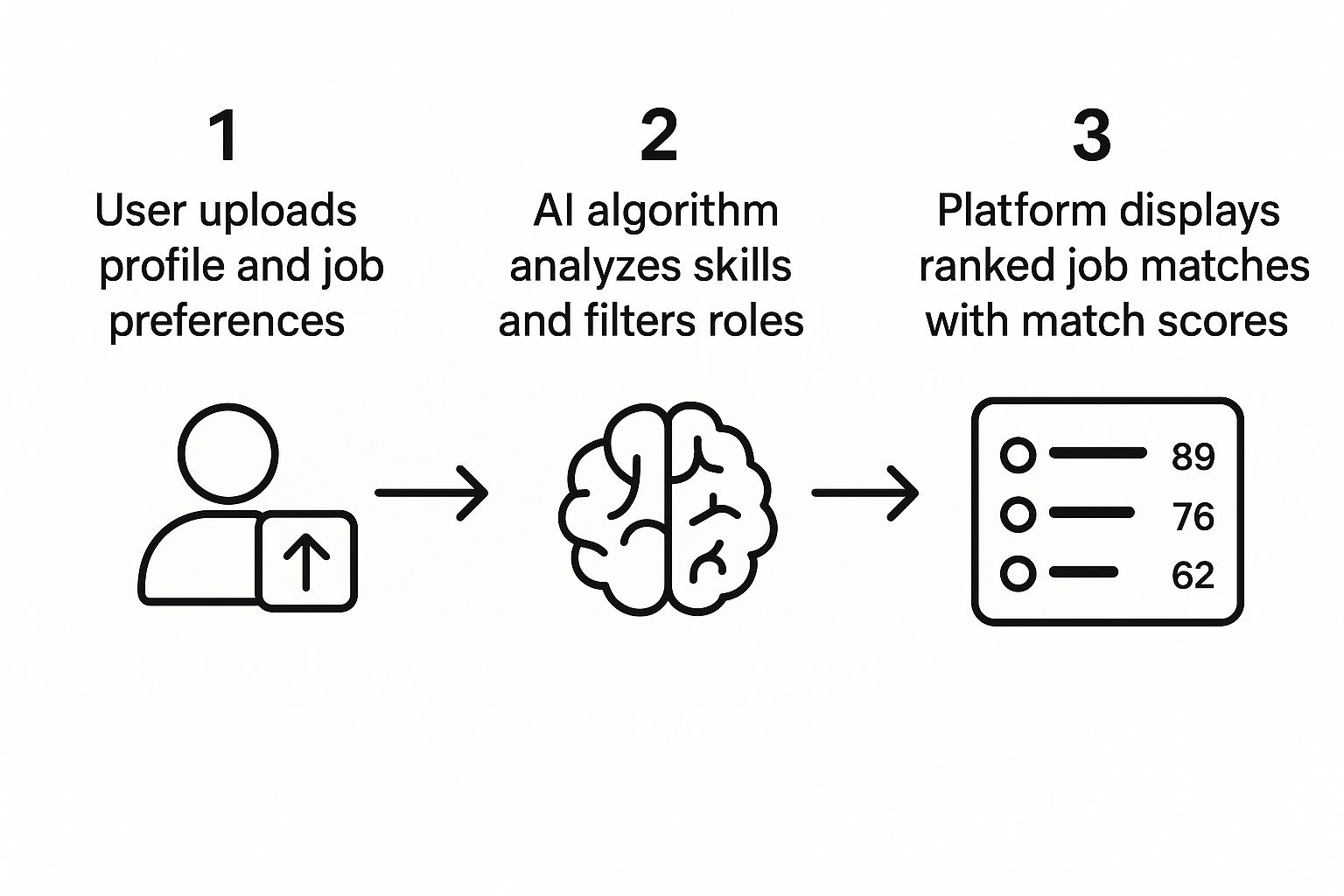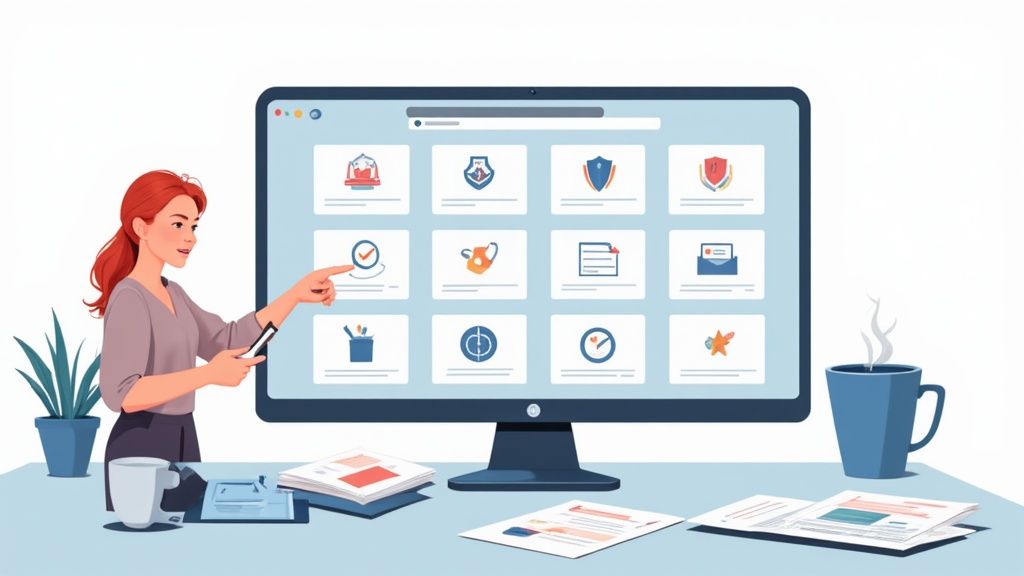How to Use AI for Job Search: Tips to Find Your Dream Role

Let's be honest, the old way of job hunting is broken. Spending hours scrolling through job boards, sending out the same generic resume, and getting nothing but silence in return? It's a soul-crushing experience. But what if you could have a smart assistant working for you 24/7, finding the perfect roles and crafting applications that get you noticed?
That's exactly what AI brings to the table. It's about taking back control and letting technology handle the grunt work—sifting through thousands of listings, customizing your resume for each one, and even prepping you for interviews. This frees you up to focus on what really matters: connecting with people and showing them why you're the right person for the job.
The New Playbook For Job Hunting With AI

Forget everything you thought you knew about applying for jobs. In today's market, you need more than just a good resume; you need a strategy. This guide is your new playbook, designed to turn you from a passive applicant into a top candidate.
We’re going to walk through how you can use tools like AIApply to not only find jobs but to build a system. Imagine a tool that scours the internet for roles that are a perfect match for your unique skills and then helps you tailor every single application to speak directly to that hiring manager.
This isn't about spamming out more applications faster. It's about precision. It's about making sure your application is so compelling that you look like the perfect fit before a recruiter even finishes their morning coffee. It's time to work smarter, not harder.
Embracing The AI-Driven Job Market
Let's talk about the elephant in the room. You hear "AI" and "jobs" in the same sentence, and it's easy to get nervous. But the story is much more interesting than the doom-and-gloom headlines suggest.
While it's true some roles are changing, AI is also carving out a whole new world of opportunity. The numbers back this up. One major study projects that while AI might displace around 92 million jobs by 2030, it’s also expected to create a net gain of 78 million new jobs worldwide. The takeaway is clear: the people who thrive will be the ones who learn to use these tools to their advantage.
Knowing how to use AI for your job search isn't just a neat trick anymore—it's a fundamental skill.
The smartest job seekers I know don't see AI as a threat. They see it as a tireless assistant. It handles the mind-numbing parts of the search so they can pour their energy into building relationships and making strategic career moves.
Your Strategic AI Toolkit
So, where do you even begin? Think of it like assembling a personalized toolkit, with a specific tool for each part of your job search. This isn't a one-size-fits-all approach; it's about picking the right instruments for the job. You can get a deeper look at these approaches in our guide to modern job search techniques.
To get you started, here's a quick overview of the key strategies we'll cover in this guide. This table gives you an at-a-glance roadmap for building your AI-powered job search machine.
Your Core AI Job Search Strategies
Each of these tactics is a piece of the puzzle. By combining them, you create a powerful, efficient system that puts you miles ahead of the competition. Let’s dive into how you can put them to work.
Craft an Application That Beats the Bots
Let's be honest. Before a human ever sees your application, it has to get past the bots. We're talking about Applicant Tracking Systems (ATS)—the software gatekeepers that scan every resume for specific keywords. Only after you pass that digital bouncer do you get a chance to impress a real person. This is exactly where knowing how to use AI for your job search gives you a massive edge.
AI-powered resume builders have come a long way from just catching typos. Think of them as your strategic partner. Instead of agonizing over a blank screen, you can copy-paste a job description straight into a tool like Teal or Rezi. The AI immediately gets to work, breaking down the listing and pinpointing the exact skills and phrases the ATS is looking for.
Suddenly, resume writing isn't a guessing game anymore. It’s a targeted strike. Your mission is to mirror the employer’s own language back to them, framing your experience in a way that makes you look like the perfect fit.
Master the Art of AI-Powered Tailoring
I always tell people to stop thinking of their resume as a single, static document. Instead, create a "master resume"—a comprehensive file that lists every skill, project, and accomplishment you can think of. This becomes your home base. When you find a role that excites you, that's when the real magic begins.
Here’s a prompt I've had great success with. After pasting in a job description, I'll ask an AI assistant:
"Analyze this job description. Pinpoint the top 5 hard skills and 3 soft skills they're asking for. Now, look at my master resume (pasted below) and write 3-4 powerful, quantified bullet points for my 'Project Manager' role that align perfectly with those skills. Make sure every bullet point kicks off with a strong action verb and shows a measurable result."
This approach means every single application you send out is custom-fitted to the job. It dramatically boosts your odds of sailing right through that initial automated screening.
Tools like Teal even give you a "match score" by showing you exactly which keywords from the job description are missing from your resume. It’s an incredible way to see where the gaps are.

Seeing it laid out visually like this gives you real-time feedback, making it so much faster to make edits that actually matter.
Automate the Analysis, Not the Authenticity
Here's the most important takeaway: let AI do the heavy lifting—the analysis and the keyword matching—but you must provide the human touch. AI can suggest a fantastic bullet point, but you're the one who has to make sure it’s 100% true and reflects what you actually accomplished.
Pro Tip: Your personal stories and unique achievements are what make you memorable. AI is the tool that gets you in the door; your authenticity is what gets you the job.
The goal is to blend AI's analytical power with your genuine experience. When you combine smart keyword optimization with your unique accomplishments, you end up with an application that's built to win. For a much deeper dive on this, check out our guide on advanced resume optimization techniques.
Let AI Find Your Perfect Job Match

Let's be honest. Spending hours scrolling through soul-crushing job boards is a terrible use of your time. The best opportunities are rarely found by just typing your job title into a search bar. It's time to get smart and let AI do the heavy lifting, finding roles that are a genuine fit for your skills and ambitions.
Modern platforms have moved miles beyond simple keyword matching. Tools like AIApply or Sonara have become something of a personal career concierge. They dig deep into your professional DNA—your skills, experience, and even your long-term goals—to uncover relevant and often unlisted opportunities you would have almost certainly missed.
Make Yourself Discoverable to AI
Some of the most powerful AI job search tools aren't the ones you actively use, but the ones recruiters are using to find you. To get on their radar, you need to turn your LinkedIn profile into a magnet for the right kind of attention.
This means treating your profile with the same care and strategy you put into your resume. Here are a few things I always tell people to focus on:
- Craft a "Golden" Headline: Don't just list your current title. Pack your headline with high-value skills and what you bring to the table. Think: "Senior Software Engineer | Python, AWS & Machine Learning | Building Scalable FinTech Solutions."
- Write a Skill-Rich Summary: Your "About" section is prime real estate. Use it to tell a compelling story about your career, weaving in the specific skills and technologies relevant to the jobs you want, not just the job you have.
- Don't Underestimate Endorsements: Actively seek out endorsements for your most critical skills. It’s more than just a vanity metric; it provides social proof and helps you climb the rankings in recruiter searches.
A well-tuned LinkedIn profile doesn't just attract recruiters. It actively trains the AI on various job platforms, teaching it precisely what you're looking for. The result? Higher-quality matches delivered right to your inbox.
When you feed the algorithms the right data, you stop chasing jobs and start attracting them.
Use AI to Analyze the Job Market
Knowing your worth and where to focus your energy is a massive advantage in any job search. AI can deliver a level of market intelligence that was once out of reach for the average person. You can use it to get real-time data on salaries, in-demand skills, and which companies are actually hiring.
For example, try prompting an AI assistant to scan a dozen job descriptions for a "Product Marketing Manager" in tech and pull out the top five most requested skills. Suddenly, you know exactly what to emphasize in your applications.
This isn't just a hunch; the data backs it up. An analysis of over 15,000 AI-related job postings showed huge swings in salary and required skills based on location, industry, and experience level. Job seekers who use this kind of data to guide their search can align their skills and salary expectations with reality, which dramatically improves their odds.
This analytical approach helps you stop wasting time on long shots and start targeting opportunities where you're a genuinely competitive candidate.
Automate Your Search Without Sounding Like a Robot

Let's be honest: applying for jobs is a numbers game. Sending out more applications should lead to more opportunities, but who has the time to fill out hundreds of nearly identical forms? This is where smart automation completely changes the game, turning a soul-crushing grind into a sharp, strategic system.
The idea isn't just to blast your resume into the void. It’s about applying to more of the right jobs, without the mind-numbing repetition. Imagine a system that hunts down great-fit roles for you and then handles the initial application on your behalf. The proof is in the numbers: job seekers who embrace AI are far more likely to land a higher-paying job—a staggering 77% of them do, compared to just 48% of those who don’t. This massive difference comes from smart automation, not from just spamming every job board.
Think of it this way: you’re outsourcing the grunt work to AI. This frees you up to focus your energy on what truly matters—networking, preparing for interviews, and making genuine connections.
Building Your Automation Game Plan
The real magic of automation isn't in the tool itself, but in the strategy behind it. You need a clear plan for deciding which applications can be automated and which ones deserve a more personal, hands-on approach. I like to think of it as creating different tiers for my job search.
First, define your absolute non-negotiables. What criteria make a role a perfect fit? These are your "Tier 1" jobs—the dream roles you’d be ecstatic to land. For these, you’ll always want to add a final human touch before hitting "submit." For everything else that still meets your core requirements, let the robots do the heavy lifting.
Here’s a practical way to set up those filters:
- Job Title Keywords: Get specific with titles like "Senior Product Manager" but also include broader terms like "Product Lead."
- Must-Have Skills: List your core strengths, such as "Agile Methodologies" or "Go-to-Market Strategy."
- Company Size & Stage: Are you aiming for the fast-paced world of startups or the stability of a large corporation? Define it.
- Location & Remote Policy: Be crystal clear about your geographic needs or if you’re strictly looking for remote work.
Once your filters are dialed in, tools like AIApply can take over and automatically fill out applications that match your exact criteria. To see this in action, check out our deep-dive guide to automate job applications the right way.
Key Takeaway: Automation is your first wave of attack. It gets your name in the running for a wide range of solid opportunities you might have otherwise missed. Your personal, human touch is the second wave—saved for the roles you're truly passionate about.
Never Let a Follow-Up Slip Through the Cracks
In a high-volume job search, it's incredibly easy to lose track of follow-ups. An automated system can double as your personal assistant, making sure you never miss a chance to reconnect.
For example, you can create a simple workflow: once an application is sent, a task automatically pops up on your calendar to check in after seven business days. This small, automated step prevents your application from vanishing into a black hole. More importantly, it signals to hiring managers that you're organized, proactive, and genuinely interested. It’s a little detail that leaves a big professional impression.
Prepare for Interviews with an AI Coach
You landed the interview—congratulations! Now, the real work begins. This is where you turn a company's initial interest into a solid job offer. Instead of just running through answers in your head, you can get a serious leg up by practicing with an AI interview coach.
Think of tools like Yoodli or VMock as your private, on-demand interview simulator. They give you a safe space to practice your talking points, tackle tough questions, and get objective feedback without the high-stakes pressure of a real conversation. Honestly, it’s one of the smartest ways to use AI in your job search.
These platforms record your practice sessions and dissect your performance on multiple levels. You get instant, data-driven insights into your delivery, helping you polish your presence and communication skills before you ever sit down with the hiring team.
Sharpen Your Delivery and Confidence
Confidence isn’t something you just have; it’s something you build through preparation. An AI coach is brilliant at spotting the subtle habits that might be weakening your message. It breaks down your performance into clear metrics, so you know exactly what to focus on.
This instant feedback is incredibly effective. You can literally watch your progress from one practice run to the next, building genuine confidence based on measurable improvement. We dive even deeper into this in our comprehensive guide on AI interview prep, which is packed with more strategies to get the most out of these tools.
Here’s a look at what an AI coach typically analyzes:
- Speaking Pace: Are you rushing your words because you're nervous? Or are you speaking too slowly and losing the interviewer's attention?
- Filler Words: It’s surprising how often we say "um," "ah," "like," or "you know." Cutting back on these instantly makes you sound more articulate and professional.
- Body Language: Many of these tools can use your webcam to analyze eye contact, posture, and facial expressions, offering tips to help you appear more engaged.
- Word Choice: The AI can flag repetitive phrases and suggest stronger, more impactful verbs and vocabulary to make your stories pop.
Generate Questions and Craft Winning Answers
Beyond just analyzing how you speak, AI is a fantastic brainstorming partner. If you’re stumped on how to answer "Tell me about a time you failed," you can ask an AI assistant to generate common interview questions for your specific role and help you frame compelling answers.
A great tactic is to use the STAR method (Situation, Task, Action, Result) as a guide for your prompts. For example, you could ask your AI:
"I'm preparing for a behavioral interview for a Senior Marketing Manager position. Can you generate five questions about leading a cross-functional project? For each one, help me brainstorm a strong answer using the STAR method based on a successful product launch I led."
This approach doesn't just hand you a script; it helps you structure your own experiences into memorable stories that prove your value. This kind of strategic preparation is crucial, especially as AI-related roles continue to surge. In the first quarter of 2025 alone, there were 35,445 AI-related jobs posted in the US—a 25.2% jump from the previous year. You can dig into the full AI job growth trends from Veritone to see just how fast this space is moving.
The goal isn't to memorize AI-generated answers. It's to use the AI to organize your thoughts and practice delivering them with clarity and confidence. Your authentic stories, polished by AI feedback, are what will win over the hiring manager.
Your Questions on Using AI for Job Searches Answered
Jumping into the world of AI for your job search can feel a little intimidating. It's one thing to read about these tools, but it’s another to actually trust them with your career. I get it. Let’s walk through some of the biggest questions I hear from job seekers so you can use these tools confidently and, more importantly, effectively.
This isn't just about adopting new tech for the sake of it. It’s about being strategic and maintaining your integrity throughout the process. Think of this as your personal guide to navigating the modern job hunt.
Will AI Make My Application Sound Generic?
This is probably the number one fear people have, and it’s a good one to have. The short answer is: only if you let it. The secret is to treat AI as a collaborator, not a ghostwriter. You should never, ever let an AI write your entire application and just hit send.
Think of it as your personal brainstorming partner. It's brilliant for getting you past that dreaded blank page, suggesting strong action verbs you might not have thought of, and making sure your resume is packed with the right keywords to get past those pesky Applicant Tracking Systems (ATS).
The best applications are always a mix of smart technology and genuine human touch. You are the final, most important editor. Read every single line, inject your own voice, and make sure the stories and accomplishments are yours and yours alone.
Your personality and unique experiences are what truly sell you as a candidate. Use AI to build the solid foundation, but use your own voice to build the house. That combination is what gets you noticed.
Is It Ethical to Automate Job Applications?
Let's draw a firm line in the sand here. There’s a huge difference between strategic automation and mindless spamming. Using AI ethically means you’re still the brains of the operation; you’re just using a tool to handle the tedious, administrative drudgery of the job search.
Here’s a better way to think about it: You're setting up highly specific, intelligent filters to apply only to roles where you are a genuinely strong and qualified fit. The AI isn't fudging your skills or experience. It’s just saving you from the soul-crushing task of typing the same information into 50 slightly different web forms.
This kind of smart automation frees up your most valuable resource—your time and energy—so you can focus on what really matters:
- Writing genuinely thoughtful, personalized cover letters for your absolute top-choice companies.
- Dedicating more time to deep interview preparation.
- Networking and building real, human connections in your field.
It’s all about working smarter so you can focus your human energy where it delivers the biggest punch.
Which AI Job Search Tools Are the Best?
Honestly, the "best" tool really boils down to what you need at a specific point in your search. There isn't one single platform that does everything perfectly for everyone. The smart move is to build a small, powerful toolkit with a few specialized platforms that excel at different things.
For example, if you want to fine-tune your resume against a specific job description, tools like Teal or Jobscan are fantastic for that. If you’re looking to practice your interview delivery and get private, instant feedback, a platform like Yoodli can be a game-changer.
But for managing the whole process—from discovering the right opportunities all the way to automating the applications—a comprehensive system is what you need. This is where tools designed for end-to-end support really prove their worth.
Ready to stop the endless scrolling and start automating your search the right way? AIApply gives you the complete toolkit to find roles, create winning applications, and get ready for interviews—all from one dashboard. Get started with AIApply today and see the difference for yourself.
Let's be honest, the old way of job hunting is broken. Spending hours scrolling through job boards, sending out the same generic resume, and getting nothing but silence in return? It's a soul-crushing experience. But what if you could have a smart assistant working for you 24/7, finding the perfect roles and crafting applications that get you noticed?
That's exactly what AI brings to the table. It's about taking back control and letting technology handle the grunt work—sifting through thousands of listings, customizing your resume for each one, and even prepping you for interviews. This frees you up to focus on what really matters: connecting with people and showing them why you're the right person for the job.
The New Playbook For Job Hunting With AI

Forget everything you thought you knew about applying for jobs. In today's market, you need more than just a good resume; you need a strategy. This guide is your new playbook, designed to turn you from a passive applicant into a top candidate.
We’re going to walk through how you can use tools like AIApply to not only find jobs but to build a system. Imagine a tool that scours the internet for roles that are a perfect match for your unique skills and then helps you tailor every single application to speak directly to that hiring manager.
This isn't about spamming out more applications faster. It's about precision. It's about making sure your application is so compelling that you look like the perfect fit before a recruiter even finishes their morning coffee. It's time to work smarter, not harder.
Embracing The AI-Driven Job Market
Let's talk about the elephant in the room. You hear "AI" and "jobs" in the same sentence, and it's easy to get nervous. But the story is much more interesting than the doom-and-gloom headlines suggest.
While it's true some roles are changing, AI is also carving out a whole new world of opportunity. The numbers back this up. One major study projects that while AI might displace around 92 million jobs by 2030, it’s also expected to create a net gain of 78 million new jobs worldwide. The takeaway is clear: the people who thrive will be the ones who learn to use these tools to their advantage.
Knowing how to use AI for your job search isn't just a neat trick anymore—it's a fundamental skill.
The smartest job seekers I know don't see AI as a threat. They see it as a tireless assistant. It handles the mind-numbing parts of the search so they can pour their energy into building relationships and making strategic career moves.
Your Strategic AI Toolkit
So, where do you even begin? Think of it like assembling a personalized toolkit, with a specific tool for each part of your job search. This isn't a one-size-fits-all approach; it's about picking the right instruments for the job. You can get a deeper look at these approaches in our guide to modern job search techniques.
To get you started, here's a quick overview of the key strategies we'll cover in this guide. This table gives you an at-a-glance roadmap for building your AI-powered job search machine.
Your Core AI Job Search Strategies
Each of these tactics is a piece of the puzzle. By combining them, you create a powerful, efficient system that puts you miles ahead of the competition. Let’s dive into how you can put them to work.
Craft an Application That Beats the Bots
Let's be honest. Before a human ever sees your application, it has to get past the bots. We're talking about Applicant Tracking Systems (ATS)—the software gatekeepers that scan every resume for specific keywords. Only after you pass that digital bouncer do you get a chance to impress a real person. This is exactly where knowing how to use AI for your job search gives you a massive edge.
AI-powered resume builders have come a long way from just catching typos. Think of them as your strategic partner. Instead of agonizing over a blank screen, you can copy-paste a job description straight into a tool like Teal or Rezi. The AI immediately gets to work, breaking down the listing and pinpointing the exact skills and phrases the ATS is looking for.
Suddenly, resume writing isn't a guessing game anymore. It’s a targeted strike. Your mission is to mirror the employer’s own language back to them, framing your experience in a way that makes you look like the perfect fit.
Master the Art of AI-Powered Tailoring
I always tell people to stop thinking of their resume as a single, static document. Instead, create a "master resume"—a comprehensive file that lists every skill, project, and accomplishment you can think of. This becomes your home base. When you find a role that excites you, that's when the real magic begins.
Here’s a prompt I've had great success with. After pasting in a job description, I'll ask an AI assistant:
"Analyze this job description. Pinpoint the top 5 hard skills and 3 soft skills they're asking for. Now, look at my master resume (pasted below) and write 3-4 powerful, quantified bullet points for my 'Project Manager' role that align perfectly with those skills. Make sure every bullet point kicks off with a strong action verb and shows a measurable result."
This approach means every single application you send out is custom-fitted to the job. It dramatically boosts your odds of sailing right through that initial automated screening.
Tools like Teal even give you a "match score" by showing you exactly which keywords from the job description are missing from your resume. It’s an incredible way to see where the gaps are.

Seeing it laid out visually like this gives you real-time feedback, making it so much faster to make edits that actually matter.
Automate the Analysis, Not the Authenticity
Here's the most important takeaway: let AI do the heavy lifting—the analysis and the keyword matching—but you must provide the human touch. AI can suggest a fantastic bullet point, but you're the one who has to make sure it’s 100% true and reflects what you actually accomplished.
Pro Tip: Your personal stories and unique achievements are what make you memorable. AI is the tool that gets you in the door; your authenticity is what gets you the job.
The goal is to blend AI's analytical power with your genuine experience. When you combine smart keyword optimization with your unique accomplishments, you end up with an application that's built to win. For a much deeper dive on this, check out our guide on advanced resume optimization techniques.
Let AI Find Your Perfect Job Match

Let's be honest. Spending hours scrolling through soul-crushing job boards is a terrible use of your time. The best opportunities are rarely found by just typing your job title into a search bar. It's time to get smart and let AI do the heavy lifting, finding roles that are a genuine fit for your skills and ambitions.
Modern platforms have moved miles beyond simple keyword matching. Tools like AIApply or Sonara have become something of a personal career concierge. They dig deep into your professional DNA—your skills, experience, and even your long-term goals—to uncover relevant and often unlisted opportunities you would have almost certainly missed.
Make Yourself Discoverable to AI
Some of the most powerful AI job search tools aren't the ones you actively use, but the ones recruiters are using to find you. To get on their radar, you need to turn your LinkedIn profile into a magnet for the right kind of attention.
This means treating your profile with the same care and strategy you put into your resume. Here are a few things I always tell people to focus on:
- Craft a "Golden" Headline: Don't just list your current title. Pack your headline with high-value skills and what you bring to the table. Think: "Senior Software Engineer | Python, AWS & Machine Learning | Building Scalable FinTech Solutions."
- Write a Skill-Rich Summary: Your "About" section is prime real estate. Use it to tell a compelling story about your career, weaving in the specific skills and technologies relevant to the jobs you want, not just the job you have.
- Don't Underestimate Endorsements: Actively seek out endorsements for your most critical skills. It’s more than just a vanity metric; it provides social proof and helps you climb the rankings in recruiter searches.
A well-tuned LinkedIn profile doesn't just attract recruiters. It actively trains the AI on various job platforms, teaching it precisely what you're looking for. The result? Higher-quality matches delivered right to your inbox.
When you feed the algorithms the right data, you stop chasing jobs and start attracting them.
Use AI to Analyze the Job Market
Knowing your worth and where to focus your energy is a massive advantage in any job search. AI can deliver a level of market intelligence that was once out of reach for the average person. You can use it to get real-time data on salaries, in-demand skills, and which companies are actually hiring.
For example, try prompting an AI assistant to scan a dozen job descriptions for a "Product Marketing Manager" in tech and pull out the top five most requested skills. Suddenly, you know exactly what to emphasize in your applications.
This isn't just a hunch; the data backs it up. An analysis of over 15,000 AI-related job postings showed huge swings in salary and required skills based on location, industry, and experience level. Job seekers who use this kind of data to guide their search can align their skills and salary expectations with reality, which dramatically improves their odds.
This analytical approach helps you stop wasting time on long shots and start targeting opportunities where you're a genuinely competitive candidate.
Automate Your Search Without Sounding Like a Robot

Let's be honest: applying for jobs is a numbers game. Sending out more applications should lead to more opportunities, but who has the time to fill out hundreds of nearly identical forms? This is where smart automation completely changes the game, turning a soul-crushing grind into a sharp, strategic system.
The idea isn't just to blast your resume into the void. It’s about applying to more of the right jobs, without the mind-numbing repetition. Imagine a system that hunts down great-fit roles for you and then handles the initial application on your behalf. The proof is in the numbers: job seekers who embrace AI are far more likely to land a higher-paying job—a staggering 77% of them do, compared to just 48% of those who don’t. This massive difference comes from smart automation, not from just spamming every job board.
Think of it this way: you’re outsourcing the grunt work to AI. This frees you up to focus your energy on what truly matters—networking, preparing for interviews, and making genuine connections.
Building Your Automation Game Plan
The real magic of automation isn't in the tool itself, but in the strategy behind it. You need a clear plan for deciding which applications can be automated and which ones deserve a more personal, hands-on approach. I like to think of it as creating different tiers for my job search.
First, define your absolute non-negotiables. What criteria make a role a perfect fit? These are your "Tier 1" jobs—the dream roles you’d be ecstatic to land. For these, you’ll always want to add a final human touch before hitting "submit." For everything else that still meets your core requirements, let the robots do the heavy lifting.
Here’s a practical way to set up those filters:
- Job Title Keywords: Get specific with titles like "Senior Product Manager" but also include broader terms like "Product Lead."
- Must-Have Skills: List your core strengths, such as "Agile Methodologies" or "Go-to-Market Strategy."
- Company Size & Stage: Are you aiming for the fast-paced world of startups or the stability of a large corporation? Define it.
- Location & Remote Policy: Be crystal clear about your geographic needs or if you’re strictly looking for remote work.
Once your filters are dialed in, tools like AIApply can take over and automatically fill out applications that match your exact criteria. To see this in action, check out our deep-dive guide to automate job applications the right way.
Key Takeaway: Automation is your first wave of attack. It gets your name in the running for a wide range of solid opportunities you might have otherwise missed. Your personal, human touch is the second wave—saved for the roles you're truly passionate about.
Never Let a Follow-Up Slip Through the Cracks
In a high-volume job search, it's incredibly easy to lose track of follow-ups. An automated system can double as your personal assistant, making sure you never miss a chance to reconnect.
For example, you can create a simple workflow: once an application is sent, a task automatically pops up on your calendar to check in after seven business days. This small, automated step prevents your application from vanishing into a black hole. More importantly, it signals to hiring managers that you're organized, proactive, and genuinely interested. It’s a little detail that leaves a big professional impression.
Prepare for Interviews with an AI Coach
You landed the interview—congratulations! Now, the real work begins. This is where you turn a company's initial interest into a solid job offer. Instead of just running through answers in your head, you can get a serious leg up by practicing with an AI interview coach.
Think of tools like Yoodli or VMock as your private, on-demand interview simulator. They give you a safe space to practice your talking points, tackle tough questions, and get objective feedback without the high-stakes pressure of a real conversation. Honestly, it’s one of the smartest ways to use AI in your job search.
These platforms record your practice sessions and dissect your performance on multiple levels. You get instant, data-driven insights into your delivery, helping you polish your presence and communication skills before you ever sit down with the hiring team.
Sharpen Your Delivery and Confidence
Confidence isn’t something you just have; it’s something you build through preparation. An AI coach is brilliant at spotting the subtle habits that might be weakening your message. It breaks down your performance into clear metrics, so you know exactly what to focus on.
This instant feedback is incredibly effective. You can literally watch your progress from one practice run to the next, building genuine confidence based on measurable improvement. We dive even deeper into this in our comprehensive guide on AI interview prep, which is packed with more strategies to get the most out of these tools.
Here’s a look at what an AI coach typically analyzes:
- Speaking Pace: Are you rushing your words because you're nervous? Or are you speaking too slowly and losing the interviewer's attention?
- Filler Words: It’s surprising how often we say "um," "ah," "like," or "you know." Cutting back on these instantly makes you sound more articulate and professional.
- Body Language: Many of these tools can use your webcam to analyze eye contact, posture, and facial expressions, offering tips to help you appear more engaged.
- Word Choice: The AI can flag repetitive phrases and suggest stronger, more impactful verbs and vocabulary to make your stories pop.
Generate Questions and Craft Winning Answers
Beyond just analyzing how you speak, AI is a fantastic brainstorming partner. If you’re stumped on how to answer "Tell me about a time you failed," you can ask an AI assistant to generate common interview questions for your specific role and help you frame compelling answers.
A great tactic is to use the STAR method (Situation, Task, Action, Result) as a guide for your prompts. For example, you could ask your AI:
"I'm preparing for a behavioral interview for a Senior Marketing Manager position. Can you generate five questions about leading a cross-functional project? For each one, help me brainstorm a strong answer using the STAR method based on a successful product launch I led."
This approach doesn't just hand you a script; it helps you structure your own experiences into memorable stories that prove your value. This kind of strategic preparation is crucial, especially as AI-related roles continue to surge. In the first quarter of 2025 alone, there were 35,445 AI-related jobs posted in the US—a 25.2% jump from the previous year. You can dig into the full AI job growth trends from Veritone to see just how fast this space is moving.
The goal isn't to memorize AI-generated answers. It's to use the AI to organize your thoughts and practice delivering them with clarity and confidence. Your authentic stories, polished by AI feedback, are what will win over the hiring manager.
Your Questions on Using AI for Job Searches Answered
Jumping into the world of AI for your job search can feel a little intimidating. It's one thing to read about these tools, but it’s another to actually trust them with your career. I get it. Let’s walk through some of the biggest questions I hear from job seekers so you can use these tools confidently and, more importantly, effectively.
This isn't just about adopting new tech for the sake of it. It’s about being strategic and maintaining your integrity throughout the process. Think of this as your personal guide to navigating the modern job hunt.
Will AI Make My Application Sound Generic?
This is probably the number one fear people have, and it’s a good one to have. The short answer is: only if you let it. The secret is to treat AI as a collaborator, not a ghostwriter. You should never, ever let an AI write your entire application and just hit send.
Think of it as your personal brainstorming partner. It's brilliant for getting you past that dreaded blank page, suggesting strong action verbs you might not have thought of, and making sure your resume is packed with the right keywords to get past those pesky Applicant Tracking Systems (ATS).
The best applications are always a mix of smart technology and genuine human touch. You are the final, most important editor. Read every single line, inject your own voice, and make sure the stories and accomplishments are yours and yours alone.
Your personality and unique experiences are what truly sell you as a candidate. Use AI to build the solid foundation, but use your own voice to build the house. That combination is what gets you noticed.
Is It Ethical to Automate Job Applications?
Let's draw a firm line in the sand here. There’s a huge difference between strategic automation and mindless spamming. Using AI ethically means you’re still the brains of the operation; you’re just using a tool to handle the tedious, administrative drudgery of the job search.
Here’s a better way to think about it: You're setting up highly specific, intelligent filters to apply only to roles where you are a genuinely strong and qualified fit. The AI isn't fudging your skills or experience. It’s just saving you from the soul-crushing task of typing the same information into 50 slightly different web forms.
This kind of smart automation frees up your most valuable resource—your time and energy—so you can focus on what really matters:
- Writing genuinely thoughtful, personalized cover letters for your absolute top-choice companies.
- Dedicating more time to deep interview preparation.
- Networking and building real, human connections in your field.
It’s all about working smarter so you can focus your human energy where it delivers the biggest punch.
Which AI Job Search Tools Are the Best?
Honestly, the "best" tool really boils down to what you need at a specific point in your search. There isn't one single platform that does everything perfectly for everyone. The smart move is to build a small, powerful toolkit with a few specialized platforms that excel at different things.
For example, if you want to fine-tune your resume against a specific job description, tools like Teal or Jobscan are fantastic for that. If you’re looking to practice your interview delivery and get private, instant feedback, a platform like Yoodli can be a game-changer.
But for managing the whole process—from discovering the right opportunities all the way to automating the applications—a comprehensive system is what you need. This is where tools designed for end-to-end support really prove their worth.
Ready to stop the endless scrolling and start automating your search the right way? AIApply gives you the complete toolkit to find roles, create winning applications, and get ready for interviews—all from one dashboard. Get started with AIApply today and see the difference for yourself.
Don't miss out on
your next opportunity.
Create and send applications in seconds, not hours.








